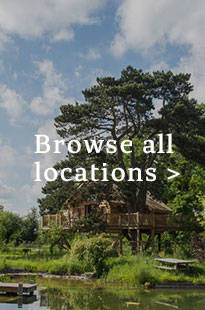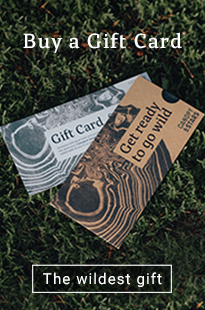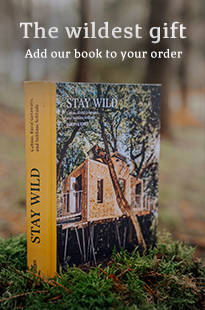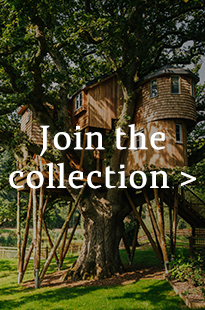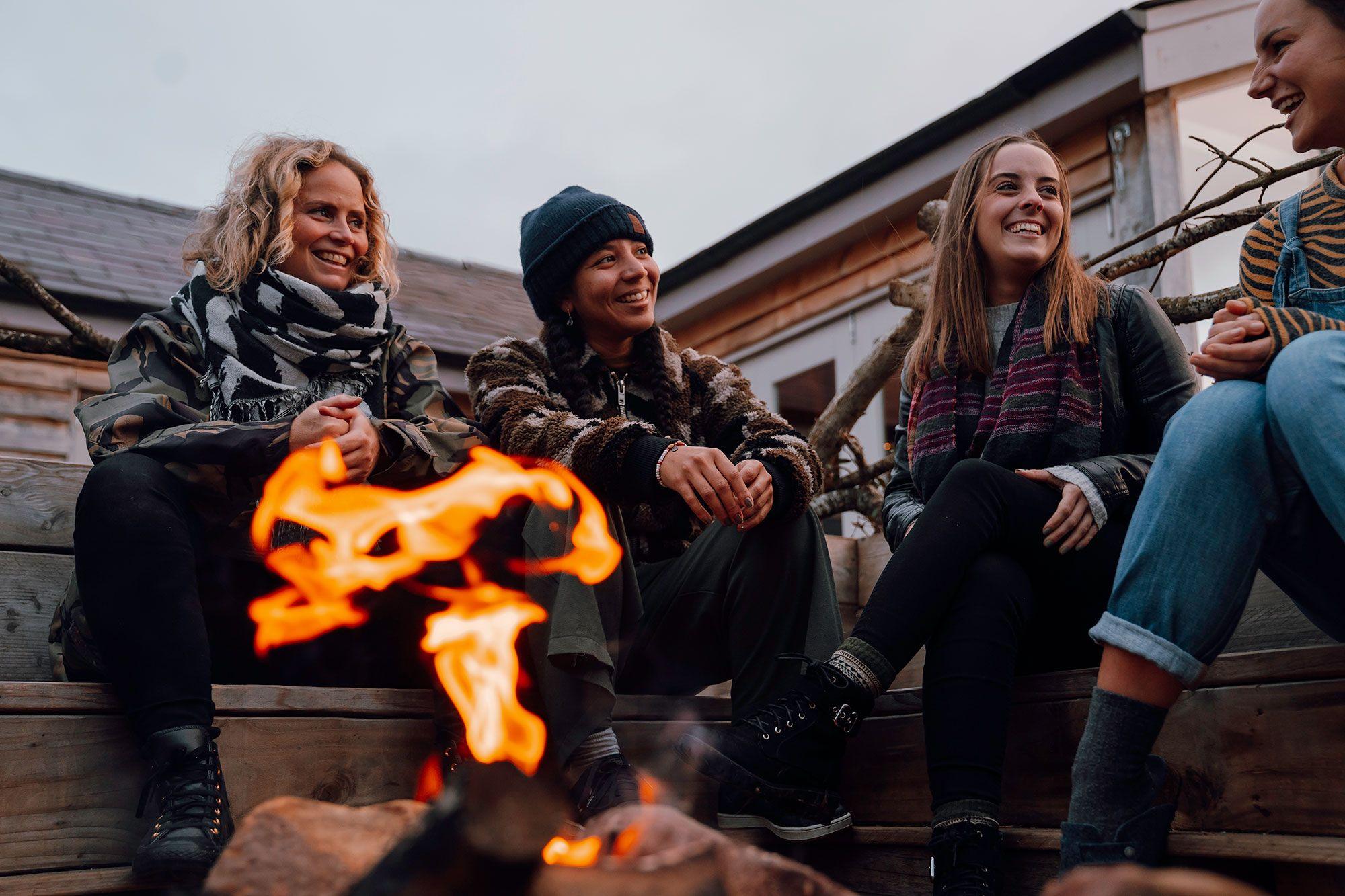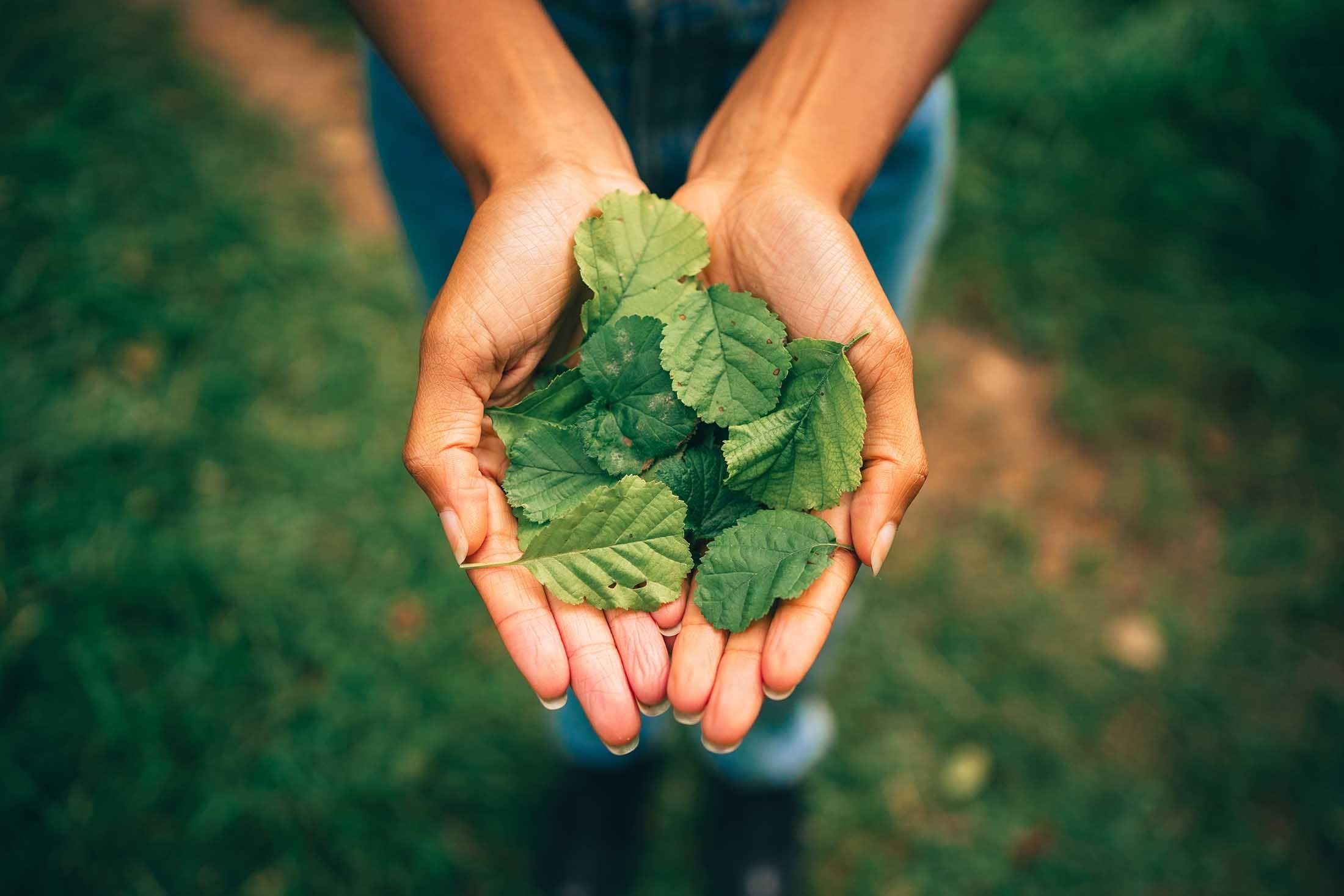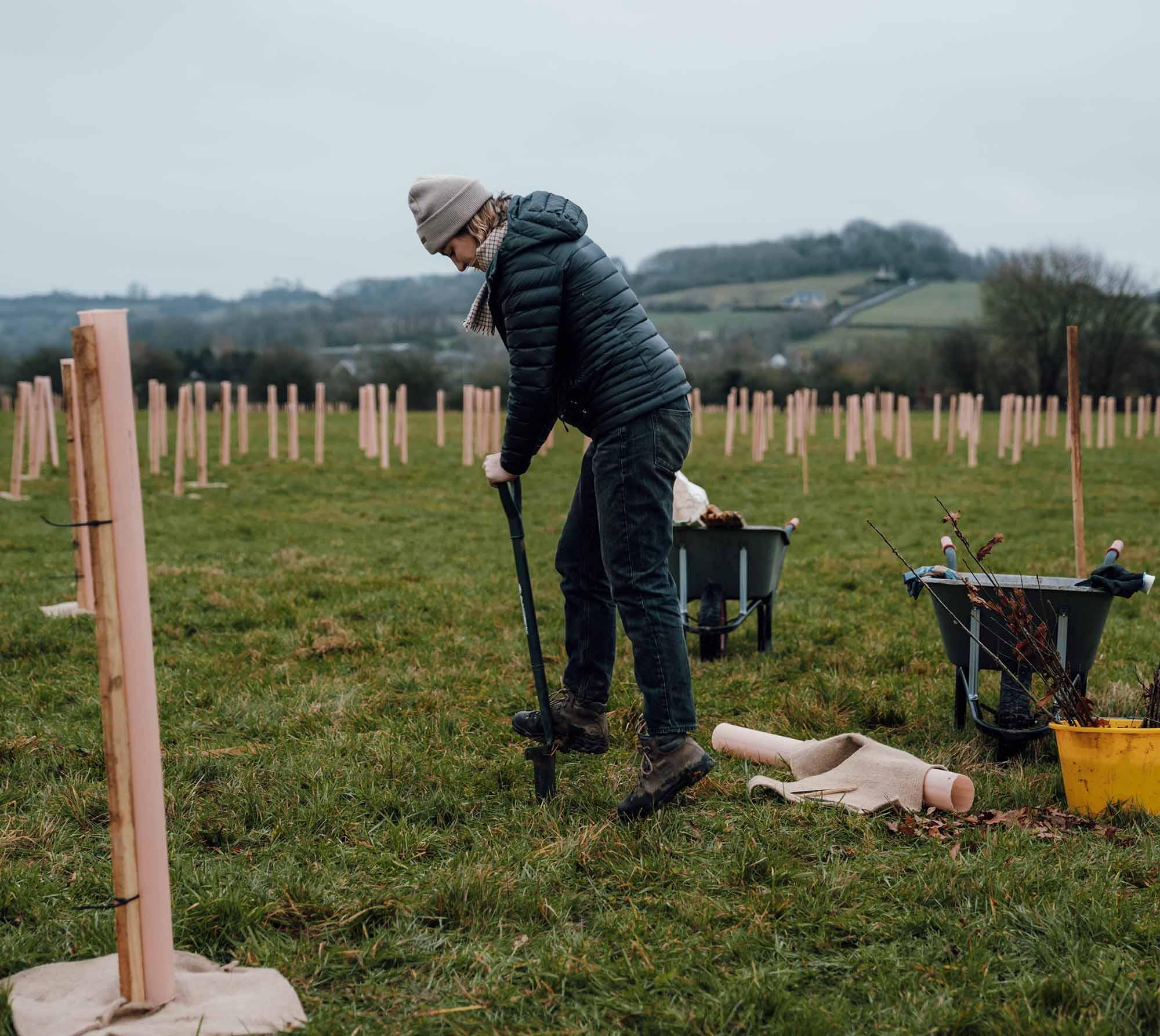- Location
- Glamping
Special occasions
- Stories
- Gift Cards
- About us
About Canopy & Stars
More from Canopy & Stars
More at Sawday's
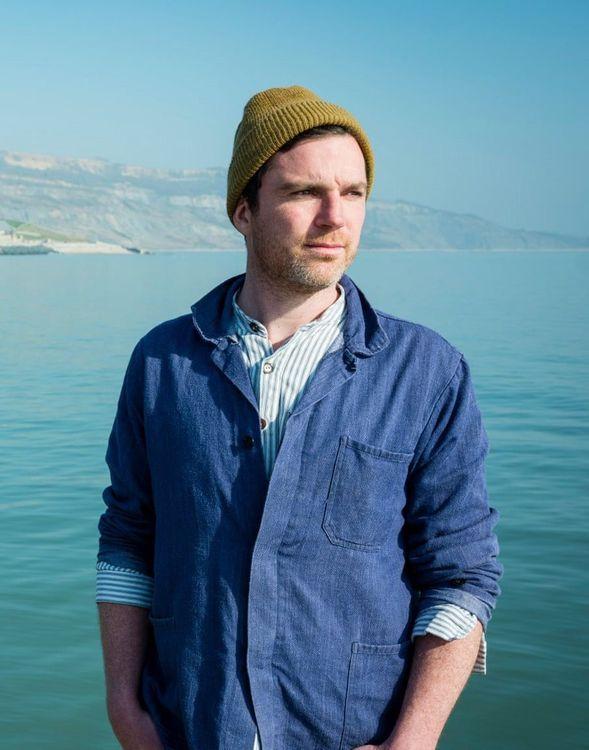
A Life More Wild - Episode 2
Gill Meller & Monachyle Mhor
A nature walk with Gill Meller
Gill Meller is a chef, teacher and forager who works extensively with the famous River Cottage. He took us on a walk through the woods near his home to pick some wild garlic, get some sea kale and whip up a simple and sumptuous meal on the beach.
Where are we going?
We're outside the house where I live near a place called Lyme Regis and we're looking out over the wood. River Cottage, which I have big associations with, is only a stone's throw from here. That's where I really learned to cook. I met a huge amount of really influential people there and it gave me the breadth of knowledge that I have today really. So we'll just walk down from the house into the woodland below and once we're through the woods, we can take the path down to the beach. At this time of year, there's quite a lot of wild food available. You just need to sort of look out for it.
What are we looking for?
We're going to find some fairly recognisable plants. The first one, that a lot of people will be familiar with, is wild garlic. Not too far from here there's a really good patch of it. Wild Garlic is very easy to identify. You can usually smell it before you see it. If you step on the leaves, you really smell it because it sort of busts the leaf and lets all those oils into the air and it's a very strong aromatic scent. It is so unique. The leaf is sort of emerald green, very vibrant, but its shape is what gives it away. I suppose you could call it feather shaped or spear shaped. And we've got some flower buds on the end of these stalks. They're also sort of spear shaped or teardrop shaped. I'm just taking a knife and cutting the wild garlic at the base.
Have you always loved cooking?
It wasn't till I was sort of 18 or 19 years old that I really started to develop a love of cooking. And it wasn't out of choice. Actually, it was out of sort of necessity. We had our first daughter, my wife and I, when we were very young and I sort of fell into kitchen work for the cash really. Over time, I developed a real passion for it and I sort of knew how to bring flavours together and and I knew how to taste food and adjust things because my mom was always so good at that. She cooked by by tasting and balancing seasoning and textures and of course if you grow up eating good food, you know what good food tastes like. Then maybe if you're interested in cooking, you can apply that knowledge.
Do you come foraging here a lot?
It's lovely to spend 10 or 15 minutes just sitting here in the wood. I take the dogs with me. It's not necessarily all about harvesting, it's just about the moment of being here really. And just listening to what's going on around you, the birds, the wind in the trees, watching, touching. That's what's so lovely about foraging. It's not necessarily about the final plate of food that you you sit down to, it's about the whole journey. It's about picking up the basket, putting your rucksack on your back and heading out the door with the hope of maybe bringing something back. But it's the journey that's the most interesting bit.
We've stopped to graze on something...
This purple flower here, that's a wood violet. This is edible. Very delicate, purple petal flowers, some dark purple veins. It's a strange-shaped flower actually, sort of dragon-like almost. I garnish salads with these. They give a gentle, subtle flavour and are very pretty to incorporate with the wild garlic petals.
And again...
It's the more common things that I enjoy picking. We've just walked by one now - the infamous stinging nettle. As you probably know, they're edible. And they're very delicious. They're plentiful, and they're completely free. And we should probably be eating a lot more nettles as a society. You can do so much with them. They are a great alternative to our more familiar sort of cultivated greens like chard, spinach and kale.
Are we getting near the sea?
Yeah we're just about to come out on the beach. This is the most magical bit. It seems like the path will go on forever, but then it opens up to this expanse and oh my god. You're seeing it at its absolute best. So you've got this sort of arcing bay flanked by some quite steep woodland. The trees almost come right down to the shoreline in places. And what you've got are all these plants and that is a plant called sea kale. See kale is one of my favourite, favourite wild plants to pick, cook and eat. Let's we go and have a look at it.
What is sea kale exactly?
It used to be quite popular and was cultivated. Still is by people who know how. But for the most part it's considered a wild plant. You could go a mile up the beach and you wouldn't find any, but it loves it here. What we've got here are these minty green leaves and the young growth is a deep, purple, pink. The young stuff is very tender, and very delicious. Raw, it can have a sweet, slightly bitter note and actually, when it's this young, it doesn't really need cooking because you're tasting it at its most pure if you like, you really get to appreciate the texture and how juicy it is and the dimensions of flavour. But what's really special about this time of year is you get the flowers. This is a is a head of sea kale in flower. And right there in the centre of this sort of rows of leaves is the flowering head of the secale. It looks just like purple sprouting broccoli and it's only here for a few weeks. This is the best bit to eat. It really is incredible. So we'll pop some of them in the basket and take them over to the campfire spot that I have up the beach. When you're picking any wild food, it's nice not to cut too much. Leave some for nature and for the wildlife, just take what you need.
So this is the outdoor kitchen?
Yeah and what's really nice about coming down here and making a fire is that you could ever think at a much slower pace. You don't have to rush things. It's not really a place for rushing. And while that's burning, I'm going to pop down to the water's edge there and fill up my pan with seawater because we're going to cook the sea kale in lovely, clear seawater. Just trying to balance the pan on three stones that sits over the fire. I don't tend to bring grills down if I can help it. If you can nestle the pan directly in the fire then you've got no need for a grill. Just put a lid on the pan and it will come to a simmer quite quickly.
It's boiling now...
Okay, so this has come to the boil, I'm just going to lift the lid. Pop the sea kale in and pop the lid back on. We'll only cook it for a minute or so. Seeing as we picked the wild garlic I'll make a quick wild garlic butter which we can pour over the sea kale. I tend not to bother with plates or anything like that. We just find big flat round stones and eat off those or straight from the pan and that tends to save washing up. They're always clean because it rains and they get washed that way.
It's ready...
So I just lift this out and get rid of the water. Pop the pan back on the heat. And I did bring some butter so we're gonna scoop that out into the pan. Just let that melt and begin to sizzle. Gonna take a handful of wild garlic and my knife and cut this up quite coarsely, chuck it into the butter. Doesn't need much cooking, I'm just taking the sort of harsh edge off the garlic. There we go. Very simple. wild garlic butter. I'll just pour it over the sea kale. Little bit of black pepper because it really is good with the kale. That's it. Wild food, cooked simply that's so, so delicious. That's what makes foraging special.
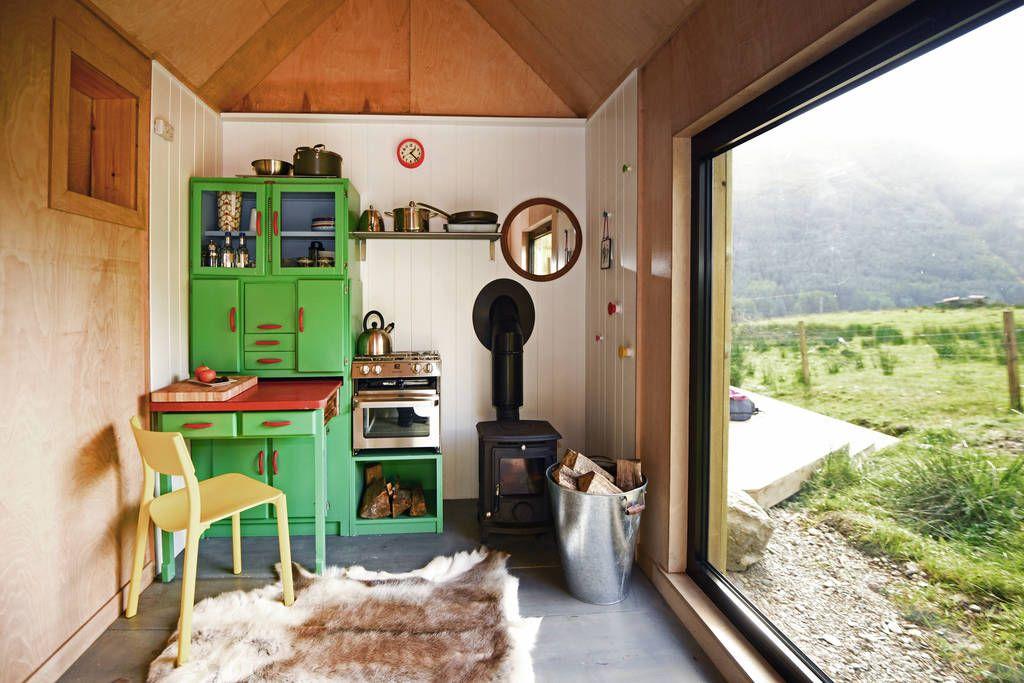
Sourcing, cooking and driving blind in the highlands with Tom from Monachyle Mhor
Tom Lewis is the creative force behind Monachyle Mhor in the Scottish Highlands, home to a couple of great glamping spaces. From his lochside hotel, he told us how tea and scones became a foodie destination and how he developed his passion for great food and careful sourcing.
Set the scene for us a bit...
Well, we're an hour and a half from the rest of the world. An hour and a half from Edinburgh, Glasgow, Dundee, Oban. The glen itself is six miles up a single track road. We overlook Loch Voil, going up behind the hotel, you've got the 10th highest mountain in Great Britain. There's nothing higher this side of us in the UK. So it's a magical place.
How did you end up there?
My mother wanted to buy my brother a bicycle. So she put a sign at the bottom of the road saying "tea and scones". And then she fancied a British, racing green, four-door Aga. So she changed the sign from "tea and scones" to "tea, scones, soup and sandwiches". And then she did a bit of b&b. And then a carafe of wine with an evening meal. But someone got very upset and said she was doing it illegally, so she applied for a licence. And that was back in 1991. And that's when the hotel started. It's a lovely story, really, my mother was completely blind. And she did everything. The only thing she can't do is read a book. My mother and father were the true visionaries. I've just taken it over.
And you used to help her drive?
Well, when you live in a rural area and the local shop is eight miles away and your mother is blind... We used to sit in her lap and we'd steer and she did the pedals and gears until our legs were long enough. You know, it was nice. She's an amazing woman.
So is that where your love of food comes from?
I came back about 25 years ago, maybe more! I was farming and travelling around the world and there didn't seem to be a future in that. I listened to two people on the radio in one week, a guy called Nico Ladenis, he was on Desert Island Discs, and a famous Scottish chef who sadly just died this week, David Wilson. I heard them both speak on the radio with such passion. And I thought, right. So I just learned to cook. I bought a book called Larousse Gastronomique and that's where it all started.
Is that where the sourcing policy comes from too?
Actually, I just bought things that were in season, because they were cheaper and you have to make money, it's quite important! At the time, you know, that was before "field to plate" and all this type of stuff. It was just really economics. Now it's all become fashionable. But it's right that at the heart of Mhor is the sourcing. It's where it all comes from. It's all about the food and the wine. You know, we have our own gardens here. But obviously, we can't produce enough. So the organic fruit and vegetables come from 17 miles away, Tomnah'a, who are amazing. We tell them, we'll take all the ugly bits because we think most people buy vegetables when they're not cooked, so they want them to look pretty. But we can take the bits that are a bit ugly, or the tops of the broad beans, or, you know, when the rocket flowers, we'll use the flowers, so we just say send it when it's good and we'll make something with it.
Is that something you think people could take into their own lives? Something that needs to spread?
Yeah. And it's really quite an easy thing to do. You know, I think it's, you know, we've been a big fan of slow food for a long time. And when people ask the question, what is slow food? And really for me slow food is, "where does it come from?" If we can buy British first and then if it comes from somewhere else in the world find out who produces it. Was it a small producer? And I think ask the question, every time you pick something up, find out where it comes from, and use that as your guide.
But it's about the place as much as the food?
This year has made me think about things a lot, you know. And it's an amazing view out my office window. I was notorious for throwing phones, so when I built my office here I have a little window right beside my desk. When I'm having one of those conversations, I just keep talking, look out the window and thinking, "it's not that bad." I mean, I'm looking right at Loch Voil and the hotel and there's those amazing greens you get in Scotland, almost psychedelic, you know, because it's been growing all winter. And suddenly the leaves just popped on a big beech tree and a chestnut tree and the larch have just gone green again after being golden all winter. And there's a ewe and twin lambs on the lawn right now, eating something they shouldn't be eating. People respond to the location. They come for the food and then get struck by the place.
And it happens the moment they arrive?
If you think you've driven up, left Edinburgh or Glasgow and you've had a bloody big argument, picked the kids up late or whatever else and you've got in the car. Then you're driving a bit fast on a dual carriageway to junction ten and suddenly you turn off the motorway after Stirling. The roads got a bit slower. So you've driven a bit slower, then you get to Callander and you're thinking, "och I still quite like you actually." And then you turn up that six miles of the Glen road. No Roman built that road. It's bloody awful. So you've got to go really slowly. And then you start realising, "god it's beautiful here".
And you do your best to keep that feeling going...
We try and encourage that sense of quiet, we try to turn off all the outside lights at night and that type of stuff because people just can't believe how dark it is. They see the stars and hear the nature - deer on the front lawn or red squirrels and pine martens, which are supposedly endangered, except round our bloody hotel! Gareth our night porter used to put out a feeder every night and one would come out from the roof with her young and eat from the bowl. I mean, it's incredible.
Do you have a favourite time of year?
Oh, I'm torn. Because spring, you know, the first peas, fresh white asparagus, the first leaves, but then you get to the autumn and the mushrooms come and we go every day. I keep a motorbike in the back to go and pick mushrooms so in the autumn your hands smell of the ground, of moss and grass. But then the summer comes - the first Scottish tomato! A fresh strawberry, a new season tomato as well. But then again, you know, the first apple... I just don't know.
You've got so much going on, doesn't it just get overwhelming?
Yeah, I've got a lot of things to do here but often if there's a lot going on, I will stand still for a brief second and close my eyes. I think it's because of how my mother is blind and I learnt it from her, but suddenly everything is exactly where it should be. You know, you get out your car in Scotland and the first thing you do is smell it, taste it. There's a breeze and you can hear the movement of the trees or the grass or you hear it and it really is quite evocative, you know. I mean it works for me.

